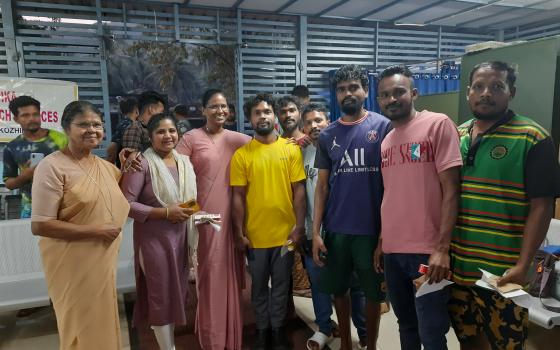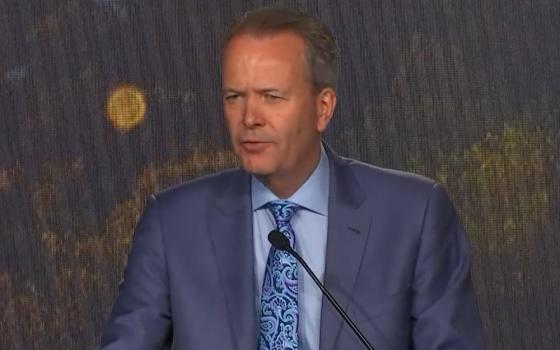"You can't get better. There's no better. But fortunately there's no worse either." -- Steven Harrison
The manuscript came unbidden over the transom. It was about the futility of searching for enlightenment and it read like a cross between the philosopher Martin Heidegger and the comedian Steven Wright. The author was an Ivy League religious studies dropout named Steven Harrison who left the security of university life to trek the world in pursuit of the answer to human suffering. He prayed with Quakers, fasted with hermits, danced with Sufis, chanted with Hindus, sat zazen with Buddhists, meditated with Tibetan teachers, and visited sacred spaces throughout the world.
One steamy day in Bodh Gaya, India, while standing near the tree where Siddhartha first sat still and saw with the eye of his soul, Harrison realized: "There is no path to enlightenment. There is no enlightenment. The problem is the seeker trying to be in control."
Steven let go and let God be in control.
I called Steven at his home in Boulder, Colo., because his writings expressed something important in a new way and I wanted to know if he'd be willing to organize them in a different way. I was happy to learn that he was for real, and a funny guy. "My stuff's been turned down by 32 publishers," he told me. "I'd be happy to work with you." A year later Crossroad published Doing Nothing: Coming to the End of the Spiritual Search. The paperback was such a word-of-mouth success that, in a reversal of publishing practice, the gigantic New York house Tarcher/Putnam bought hardcover rights from us.
My wife, Vickie, and I visited Steven and his family in Boulder a year later. They lived in a simple home on the side of a mountain overlooking the lights of the city. A few years earlier Steven left a California commune he had co-founded and wandered east to Boulder. He and his wife, Jennifer Cleary, began raising money to bring children with twisted spines in the Himalayas to America for life-changing surgeries.
While Vickie and I were there we met one of the children who were living with the Harrisons while in recovery. A bright little girl named Dorje, who was once bent over like a hairpin, now walked tall and as straight as a finishing school graduate. Jennifer had been volunteering at a medical tent in Nepal when Dorje and her family hiked down the mountains and journeyed 30 days to Kathmandu in search of a medical miracle. Dorje was dying from advanced scoliosis. There was no help in Nepal. With the consent of the parents, Jennifer and Steven brought Dorje to the United States for surgeries from the best doctors. It was a miracle of love.
Steven and Jennifer carried other children with crooked spines down the mountain, into their home, and took them back to their parents whole. They started a foundation called All Together Now International to serve underprivileged communities in India and Tibet, and later blended it into the mission of ROKPA, an international relief organization that helps the poorest of the poor in the most remote regions of the world. It turns out that "doing nothing" is a surprisingly active place. It marks the end of the spiritual search and the beginning of an inspired life.
Steven Harrison has written eight other books and helped start a publishing company, Sentient Publications, which brings out books on spirituality, holistic health, experimental education and ecology.
While Steven's own writings may seem antithetical to traditional Catholic spirituality, they strike a chord with the themes of many Catholic mystics, such as French Jesuit Fr. Jean Pierre de Caussade, who preached self-abandonment and surrender to God, and whose teachings weren't published until after his death for fear of being misunderstood. He wrote: "In the state of self-abandonment ... the soul is as light as a feather, as fluid as water, simple as a child, as easily moved as a ball, so as to move and receive all the impressions of grace."
It's easy to misunderstand something so simple and profound as "doing nothing" because it suggests quietism and non-involvement with issues. Truth is, doing nothing is a well of creativity. When we let go, God takes over.
It matters not whether we study at Harvard or climb a cliff to see a guru or just stay put in Kansas. Wherever we are, God -- always active everywhere Love and Wisdom -- is. "If I ascend up into heaven, thou art there. If I make my bed in hell, behold thou art there!" (Psalm 139:8). We don't have to do anything. We have to know something. God, benevolent divine energy, is already here, running through all our lives like gold through a mountain chain. Everything is connected. Everything belongs. Everything is somehow right.
Steven's book begins with a Zen poem:
Sitting quietly,
doing nothing -- Spring comes
and the grass grows.
[Michael Leach is learning to do nothing from his home in a valley in Connecticut, where he shepherds NCR's Soul Seeing columns and guides a small flock of Orbis Books authors.]



